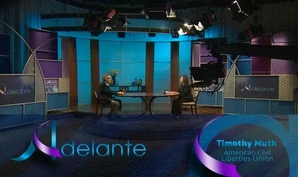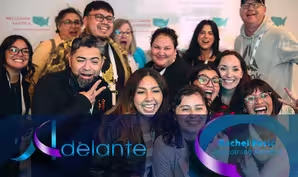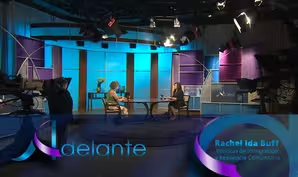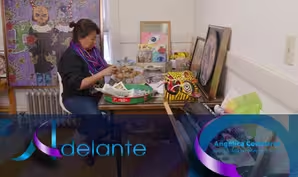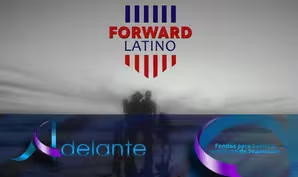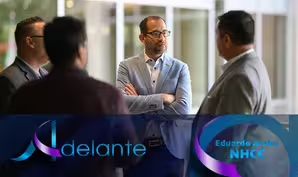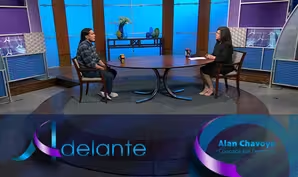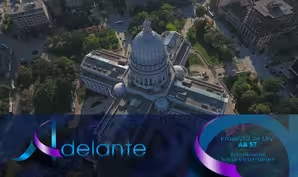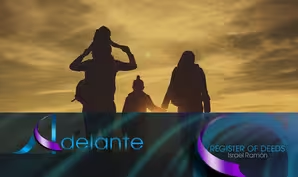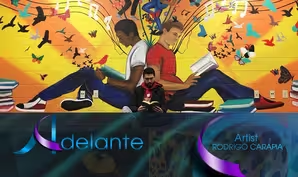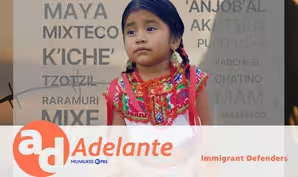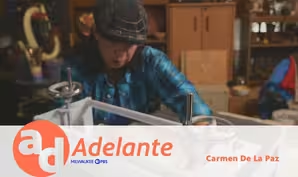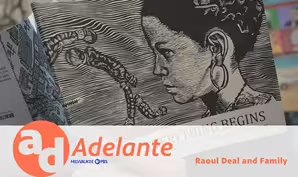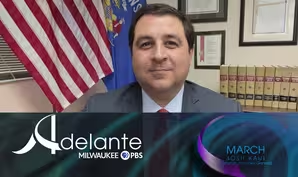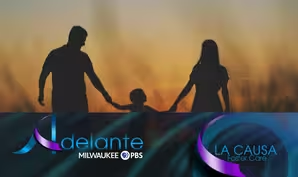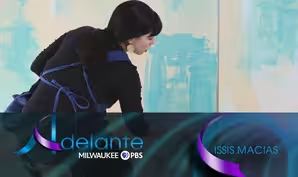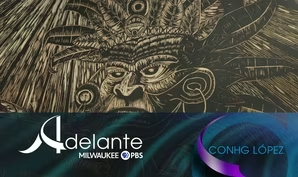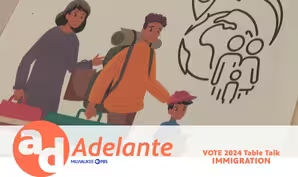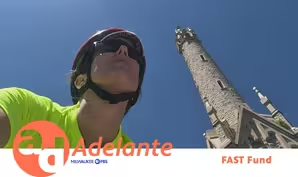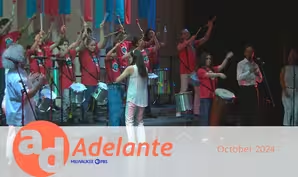Adelante
Rachel Peric - Welcoming America
Clip: Season 26 | 9m 53sVideo has Closed Captions
Welcoming America plays a crucial in building bridges and creating environments that thrive.
As the immigration landscape continues to evolve, organizations like Welcoming America play a crucial role in building bridges and creating environments where everyone can thrive. Rachel Peric is with us today to explain how communities can be strengthened through welcoming policies and programs that promote social cohesion and economic development for all residents, regardless of their background
Problems playing video? | Closed Captioning Feedback
Problems playing video? | Closed Captioning Feedback
Adelante is a local public television program presented by MILWAUKEE PBS
This program is made possible in part by the following sponsors: Johnson Controls
Adelante
Rachel Peric - Welcoming America
Clip: Season 26 | 9m 53sVideo has Closed Captions
As the immigration landscape continues to evolve, organizations like Welcoming America play a crucial role in building bridges and creating environments where everyone can thrive. Rachel Peric is with us today to explain how communities can be strengthened through welcoming policies and programs that promote social cohesion and economic development for all residents, regardless of their background
Problems playing video? | Closed Captioning Feedback
How to Watch Adelante
Adelante is available to stream on pbs.org and the free PBS App, available on iPhone, Apple TV, Android TV, Android smartphones, Amazon Fire TV, Amazon Fire Tablet, Roku, Samsung Smart TV, and Vizio.
Providing Support for PBS.org
Learn Moreabout PBS online sponsorshipA welcoming America is an organization that works to support communities in building a welcoming society and welcoming places uh where every one of us, including immigrants, can thrive, can belong, and can prosper in the places we call home.
I'm not the founder of Welcoming America, but it has been a labor of love for many years for me.
My own family came as refugees to the United States.
they had left and survived a place that really represents the worst of what uh society can do when we let prejudice uh and dehumanization get the better of us uh and came to the United States I think as many immigrants do believing in its promise of freedom and opportunity and and benefiting from that but we also know that there is a very strong economic case and I think that that's especially true for states like Wisconsin as well as many rural places in the United States where immigr igrants have accounted for just about all of the population growth of many places in the US which has had a really outsized economic impact in terms of making sure that communities can stabilize can see businesses on Main Street can have the workforce that we need.
We have an aging population here in the United States.
So we need we need people not just to fill jobs but to really be rooted in our communities to be able to thrive.
So what we're talking about here is really our economic future, but also building a country that really lives into its democratic values and the idea that we can come from anywhere in the world and call ourselves an American.
Beyond the economic part of what happens when immigrants are welcome in a country, it is also established in your beliefs in your phil philosophy that immigrants enrich communities in many other ways.
Can you comment on that?
just to keep putting a finer point on the economics of that because I know that is important for many people.
Um I just wanted to share you know a little bit of statistics uh in terms of uh Wisconsin $3 billion is what immigrants in Wisconsin are contributing um you know both in uh state and local taxes and also federal taxes.
So um there is uh you know a lot that immigrants are paying into the system and unfortunately um for many immigrants um not being able to access or benefit from um all that they are putting in.
So we believe it's really important for communities to make sure that everyone including immigrants can contribute their fullest.
And that is not just an economic contribution but also being able to fully participate in decision-m in communities, being able to volunteer, serve on boards and commissions, being able to connect with neighbors at a human level, socially cohesive.
We know that building trust across lines of difference makes for communities that are safer.
And we also know that many communities benefit so much from the cultural contributions that people make in cuisine, in arts and and culture and humanities.
So there's just so much that enriches communities as a result of migration and as a result of people fully belonging in the places we call home.
Do they have a role in the resilience of their communities?
Absolutely.
You know, I think the act of migration is itself an act of great resilience to pick up everything and move to a new place.
um shows, you know, an ability to adapt and and we see that in the way that, you know, so many immigrants, including my own family, you know, have become entrepreneurs, uh, you know, opening businesses and, uh, you know, being able to build, uh, a new life and also communities themselves are more resilient when they are able to adapt, uh, and make it easier for people to be fully part of the community.
Rachel, what is the welcoming standard?
It is a roadmap for communities to look at how to become a more welcoming place, making it easier to open a business, making it easier to learn English, reducing some of the common barriers that immigrants might face to being full participants civically, socially, economically, and encoding those in a standard.
And we also have a program called certified welcoming where communities can demonstrate an ability to meet that standard and then be certified as a welcoming city or county.
What is equitable access?
How the welcoming standard uh helps that equitable access is about making sure that all members of the community whether you're an immigrant or not can can access services, access resources.
And so in the standard we want to make sure that communities know how to do that in practical ways.
How does it build trust?
Building trust between neighbors.
A lot of our communities are really segregated.
We don't have naturally a lot of opportunities to connect with one another.
So many communities are doing really wonderful work to bring neighbors together, whether that's over a soccer pitch or over community dinners or using local arts and culture to you know help people connect at a human level.
That work is more than ever so important I think as many people don't feel that trust.
I mean both immigrants especially right now especially people who may not have documentation there's just so much fear and I think you know many Americans are feeling that sense of fear or or feeling that there isn't trust with neighbors.
So we have to be really intentional about building that and I think welcoming is one of the many ways that we can be smart and thoughtful in our own backyards about connecting with our neighbors and and building trust.
I think that education is one of the most important areas for communities to be thinking about.
A quarter of all children in this country are immigrants or children of immigrants.
Many of them are hearing messages that they don't belong.
We've seen a rise in bullying and hate crime.
So at a minimum I think you know our uh educational institutions and especially K12 can be playing a role in you know reducing fear, reducing harm.
It's the place where you access information.
It's the place where you meet first friends.
It's the place where you maybe learn to speak English.
And so equipping schools to be prepared, to be welcoming is just so critically important.
Right now, Latinos are facing many challenges and not just Latinos but other um immigrant and refugee groups is welcoming American using a special ways to address these challenges and what are for you the key challenges that these communities are facing.
I think that one of the most important messages that I want to bring to your audience is that, you know, regardless of what is happening in Washington, we have so much power in our own backyards, in our communities, to to reinforce people's belonging, to reinforce trust between neighbors, and you know, regardless of our political affiliation, regardless of our identity or race or origin, all of us benefit from living in communities where we feel valued, where we can trust one another.
And building a welcoming community is something that we can all do and reinforce for one another.
And then every year in September, we host an event called Welcoming Week.
It's being celebrated across the US and around the world.
That's something that we all have the power to do, and we would love for as many people as possible to participate in that.
We have members in about 47 states and any organization that is a local government or a nonprofit can become a member.
We do have a few members in Wisconsin and a number of them are in rural parts of Wisconsin where the role of immigrants you know especially in revitalizing industries like the dairy industry for example is especially important.
So much fear in communities in mixed status families, you know, among people whose status is really tenuous at this moment or or people who don't have status just given the, you know, the deportations that are happening.
You know, have many loved ones who are confronting, you know, impossible decisions about whether to say goodbye to family members and know that they may not see them ever again.
I mean, it's just gut-wrenching.
There is no doubt, you know, the the human consequences, the economic consequences, the the public health consequences, not only to people who are directly impacted, but to all of us.
And so I think it's just so important for all of us to be kind of rowing together to create the opposite of what we're seeing, the opposite of the fear and the hate and, you know, building what we can in our own backyards to really again reinforce our our shared belonging and, you know, build build the country that I know that we can be.
[Music] [Music]
Video has Closed Captions
Clip: S26 | 9m 3s | How Wisconsin Law Enforcement is Cooperating with ICE (9m 3s)
Rachel Peric - Welcoming America
Video has Closed Captions
Clip: S26 | 9m 53s | Welcoming America plays a crucial in building bridges and creating environments that thrive. (9m 53s)
Rachel Ida Buff, Lessons that families at risk of deportation can learn
Video has Closed Captions
Clip: S26 | 10m 19s | Dr. Rachel Ida Bluff is with us to discuss lessons that families at risk of deportation can learn. (10m 19s)
Mexican Artist Angélica Contreras transforms canvas
Video has Closed Captions
Clip: S26 | 5m 43s | From her studio in Madison, Wisconsin, Mexican artist Angélica Contreras transforms the canvas (5m 43s)
Forward Latino Fondos para Familias
Video has Closed Captions
Clip: S26 | 6m 42s | The City of Milwaukee awarded $100,000 to Forward Latino as part of an effort to support families (6m 42s)
Video has Closed Captions
Clip: S26 | 7m 9s | NHCC addresses the critical need for Hispanic representation in corporate leadership. (7m 9s)
Camino a la Libertad - Alan Chavoya
Video has Closed Captions
Clip: S26 | 6m 36s | Alan Chavoya, Professor of Philosophy, informing undocumented families about legal and human rights. (6m 36s)
Video has Closed Captions
Clip: S26 | 8m 59s | The debate over cooperation between local authorities and federal immigration agencies. (8m 59s)
Video has Closed Captions
Clip: S26 | 9m 12s | From the Office of the Register of Deeds, attorney Israel Ramón talks about the services his office (9m 12s)
Video has Closed Captions
Clip: S26 | 5m 37s | Rodrigo Carapia brings a gift to children and young people in schools and correctional facilities. (5m 37s)
Video has Closed Captions
Clip: S26 | 5m 25s | Margaret Cargioli, Director of Policy and Advocacy at the Immigrant Defenders Law Center (5m 25s)
Video has Closed Captions
Clip: S26 | 10m | Carmen de la Paz was in charge of the Waukesha Strong Tile Project. (10m)
Video has Closed Captions
Clip: S26 | 7m 52s | Continuum is an exhibition presented in honor of the work of Raoul Deal. (7m 52s)
Wisconsin State Attorney General Josh Kaul Full Interview
Video has Closed Captions
Clip: S26 Ep6 | 17m 57s | Full interview with State AG Josh Kaul (17m 57s)
Video has Closed Captions
Clip: S26 Ep6 | 5m 14s | Karen Steinbach of La Causa talks about the foster care program offered by this organization. (5m 14s)
Discover the art and career of Issis Macias
Video has Closed Captions
Clip: S26 Ep6 | 9m 52s | Discover with us the art and career of Issis Macias (9m 52s)
Artist Congh López, originally from Oaxaca
Video has Closed Captions
Clip: S26 Ep5 | 6m 21s | Artist Congh López, originally from Oaxaca, invites us to discover his artistic techniques. (6m 21s)
Vote 2024 Table Talk on Immigration
Video has Closed Captions
Clip: S26 Ep1 | 9m 57s | 4th part of the series “Vote 2024 Table Talk” - focus on Immigration (9m 57s)
Video has Closed Captions
Clip: S26 Ep1 | 7m 55s | Local 212 MATC Fast Fund is a non-profit organization that provides assistance to MATC students. (7m 55s)
Video has Closed Captions
Clip: S26 Ep1 | 6m 5s | Bembé Drum and Dance is a community-based cultural organization that promotes intergenerational art (6m 5s)
Providing Support for PBS.org
Learn Moreabout PBS online sponsorshipSupport for PBS provided by:
Adelante is a local public television program presented by MILWAUKEE PBS
This program is made possible in part by the following sponsors: Johnson Controls
